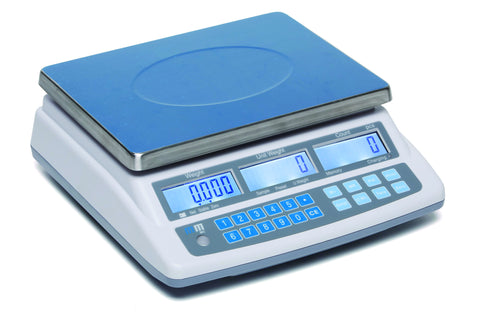Scale calibration is the process of adjusting the readings of a weighing scale to ensure its accuracy. You can use known weights to adjust the dial or digital display.
This is important in many industries where accuracy is essential, such as the pharmaceutical and food industries. Remember to calibrate your scales regularly to guarantee precision and reliability. Calibrating your weighing scale is a simple process that any trained staff can accomplish.
6 Steps to Calibrate Your Scale
1. Clean the Weighing Scale
It's important to keep your weighing scale clean and well-maintained to ensure accurate readings. You may start by dusting off the surface of the scale with a soft cloth. Then, use a mild soap and water solution to wipe down the scale platform. Be sure to avoid getting any water on the electronics.
2. Change the Batteries
Although changing the batteries is an optional step, it is best to check if you have fully charged or a new set of batteries when performing the calibration. This way, the procedure will not be interrupted, and it also ensures the reliability of the process.
3. Turn the Scale On a Few Minutes Before the Calibration
Performing a calibration procedure on digital scales requires powering them up a few minutes beforehand. This gives the scale time to warm up and stabilise, which helps ensure more precise results.
4. Position the Scale Properly
Remember to position the scale properly and not wobbly. The scale should be level and on a solid, stable surface. If your floor isn't level, put a thin piece of cardboard or a smooth stone under one corner of the scale until it's level. A platform or weight plate that isn't level will give inaccurate readings.
5. Place a “Known” Weight
A “known” weight is that which weighing scale manufacturers include in calibration kits with accurately measured and recorded weights. They have certified weights according to standards that are traceable to international or national standards. They are designed as references for calibrating scales and other measuring devices.
Simply place the “known” weight on the scale's platform or plate and read the measurement. If the two values do not match, the scale must be adjusted until they do.
6. Use the Calibrated Weighing Scale
Once the scale is calibrated, you can start using it. However, remember to recalibrate your weighing scale regularly to maintain accuracy and dependability. If you are unsure about the process, ask a reputable scale supplier near you for calibration services.

Why is scale calibration important?
Over time, weighing scales are exposed to wear and tear, which leads to inaccurate measurements. For this reason, it is essential to calibrate your scales regularly, especially if you use them for measuring cooking ingredients, medicine mixtures or construction materials.
● Precision and Accuracy
If you need to be precise with your measurements, say, when cooking or baking then it is essential to use a scale that is correctly calibrated. This way, the food you serve will have the right weight, taste and quality.
● Improved Efficiency
If you run a business that relies on exact measurements, such as an infrastructure or manufacturing facility, using calibrated scales helps improve your efficiency and productivity. You can finish projects and products with the confidence that they are quality, durable and reliable for public use and consumption.
● Increased Safety
In some cases, using an uncalibrated or inaccurate scale can be dangerous. For example, if you are measuring chemicals for use in a pharmaceutical process, it is essential to use a properly calibrated weighing device to avoid unwarranted adverse effects on users.
● Greater Customer Satisfaction
If you sell products that are weighed on a scale such as produce at a farmers market, a calibrated weighing scale helps ensure that your customers are happy with their purchase. You will receive the right purchase price for accurate product weights. And you don’t have to worry about over or under-pricing your items when selling.
● Meet Regulatory Requirements
Most industries require calibrated scales under state regulations. For example, the retail industry is subject to strict rules regarding the use of scales. It may be necessary for you to use a scale that is trade-approved by your local government. In this case, you may need to look into the National Trade Measurement Regulations of 2009.

How often should you calibrate your weighing device?
Generally, it is recommended that scales be calibrated at least once every three months. The frequency of calibration will depend on the environment in which it is used. Let’s say scales used in dusty or humid conditions may require more frequent calibration than those found and installed in clean, dry conditions.
Another factor to consider is the type of scale you are using. A digital scale operated in a controlled laboratory environment may only need an annual calibration, while a mechanical scale used in a rough industrial setting may require a monthly calibration.
While you can perform the calibration by yourself, some instances may necessitate you to rely on the expertise of weighing scale providers to complete the procedure.
Contact Meltrons Australia for a comprehensive onsite calibration!

